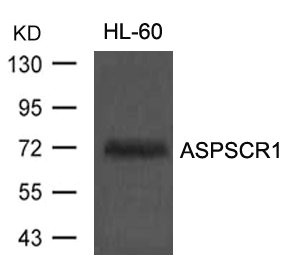ASPSCR1 Antibody
-
货号:CSB-PA180850
-
规格:¥2024
-
图片:
-
其他:
产品详情
-
产品名称:Rabbit anti-Homo sapiens (Human) ASPSCR1 Polyclonal antibody
-
Uniprot No.:Q9BZE9
-
基因名:ASPSCR1
-
宿主:Rabbit
-
反应种属:Human
-
免疫原:Peptide sequence around aa.303 ~307(P-Q-Q-E-Q) derived from Human ASPSCR1.
-
免疫原种属:Homo sapiens (Human)
-
克隆类型:Polyclonal
-
纯化方式:Antibodies were produced by immunizing rabbits with synthetic peptide and KLH conjugates. Antibodies were purified by affinity-chromatography using epitope-specific peptide.
-
浓度:It differs from different batches. Please contact us to confirm it.
-
产品提供形式:Liquid
-
应用范围:ELISA,WB
-
推荐稀释比:
Application Recommended Dilution WB 1:500-1:1000 -
Protocols:
-
储存条件:Upon receipt, store at -20°C or -80°C. Avoid repeated freeze.
-
货期:Basically, we can dispatch the products out in 1-3 working days after receiving your orders. Delivery time maybe differs from different purchasing way or location, please kindly consult your local distributors for specific delivery time.
相关产品
靶点详情
-
功能:Tethering protein that sequesters GLUT4-containing vesicles in the cytoplasm in the absence of insulin. Modulates the amount of GLUT4 that is available at the cell surface. Enhances VCP methylation catalyzed by VCPKMT.
-
基因功能参考文献:
- ASPL efficiently promotes p97 hexamer disassembly, resulting in the formation of stable p97:ASPL. Overproduction of ASPL disrupts p97 hexamer function in endoplasmic reticulum-associated protein degradation. PMID: 27762274
- These results show that ASPL-TFE3 regulates cell cycle progression and induces cellular senescence by up-regulating p21 expression. PMID: 27673450
- Studies indicate that alveolar soft part sarcoma showed a specific chromosomal alteration, der(17)t(X:17)(p11:q25), resulting in the fusion of the TFE3 transcription factor gene (Xp11) with alveolar soft part sarcoma critical region 1 (ASPSCR1) at 17q25. PMID: 26516944
- A conditional expression in mice of the fusion gene ASPSCR1-TFE3 from human alveolar soft part sarcoma (ASPS) generated a model that recapitulates the human tumor histologically and by expression profile. PMID: 25453902
- ASPL is a cofactor of the hexameric ATPase complex, known as p97. The central area in ASPL, containing both a SHP box and a UBX domain, is required for binding to the p97 N-domain. PMID: 25078495
- Results support a gain-of-function role for ASPSCR1-TFE3 contributing to proliferation and survival of cancer cells. PMID: 23288701
- Promotes methylation of VCP by METTL21D PMID: 23349634
- Data support a model in which TUG controls p97 oligomeric status at a particular location in the early secretory pathway and in which this process regulates membrane trafficking in various cell types. PMID: 22207755
- In alveolar soft part sarcomas with unusual locations or histology, we consider that the detection of the ASPSCR1-TFE3 fusion transcript would be the highly effective diagnostic technique. PMID: 21835426
- Immuno-detection of TFE3 and RT-PCR-based identification of ASPL/TFE3 fusion transcripts are powerful tools in the diagnosis of alveolar soft part sarcoma. PMID: 21279521
- Immunohistochemical discrimination between the ASPL-TFE3 fusion proteins of alveolar soft part sarcoma PMID: 18176180
显示更多
收起更多
-
相关疾病:A chromosomal aberration involving ASPSCR1 is found in patients with alveolar soft part sarcoma. Translocation t(X;17)(p11;q25) with TFE3 forms a ASPSCR1-TFE3 fusion protein.
-
亚细胞定位:Endomembrane system; Peripheral membrane protein. Endoplasmic reticulum-Golgi intermediate compartment membrane; Peripheral membrane protein. Cytoplasm. Nucleus.
-
组织特异性:Ubiquitous. Highly expressed in testis, heart, skeletal muscle and pancreas.
-
数据库链接:
HGNC: 13825
OMIM: 606236
KEGG: hsa:79058
STRING: 9606.ENSP00000302176
UniGene: Hs.298351
Most popular with customers
-
-
YWHAB Recombinant Monoclonal Antibody
Applications: ELISA, WB, IF, FC
Species Reactivity: Human, Mouse, Rat
-
Phospho-YAP1 (S127) Recombinant Monoclonal Antibody
Applications: ELISA, WB, IHC
Species Reactivity: Human
-
-
-
-
-





















